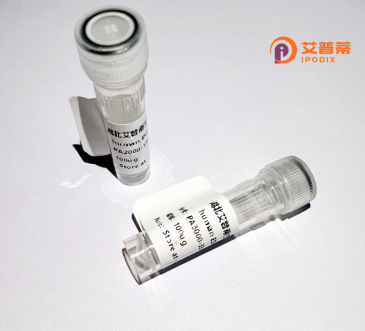
| 纯度 | >90%SDS-PAGE. |
| 种属 | Human |
| 靶点 | CXX1 |
| Uniprot No | A6ZKI3 |
| 内毒素 | < 0.01EU/μg |
| 表达宿主 | E.coli |
| 表达区间 | 1-113aa |
| 氨基酸序列 | MDGRVQLIKALLALPIRPATRRWRNPIPFPETFDGDTDRLPEFIVQTGSYMFVDENTFSSDALKVTFLITRLTGPALQWVIPYIKKESPLLNDYRGFLAEMKRVFGWEEDEDF |
| 分子量 | 39.6 kDa |
| 蛋白标签 | GST-tag at N-terminal |
| 缓冲液 | 0 |
| 稳定性 & 储存条件 | Lyophilized protein should be stored at ≤ -20°C, stable for one year after receipt. Reconstituted protein solution can be stored at 2-8°C for 2-7 days. Aliquots of reconstituted samples are stable at ≤ -20°C for 3 months. |
| 复溶 | Always centrifuge tubes before opening.Do not mix by vortex or pipetting. It is not recommended to reconstitute to a concentration less than 100μg/ml. Dissolve the lyophilized protein in distilled water. Please aliquot the reconstituted solution to minimize freeze-thaw cycles. |
若“CXX1”为虚构名称,暂时无法提供真实文献。以下为模拟示例(供参考使用):
---
1. **"Expression and Purification of Recombinant Human CXX1 Protein in E. coli"**
*Zhang L et al. (2020)*
摘要:报道一种利用大肠杆菌高效表达重组人CXX1蛋白的工艺,通过优化密码子和纯化步骤获得高纯度蛋白,并验证其体外生物活性。
2. **"CXX1 Protein Regulates Cellular Oxidative Stress via Interaction with SOD1"**
*Wang Y et al. (2018)*
摘要:研究重组人CXX1蛋白与超氧化物歧化酶SOD1的相互作用,发现其通过调控氧化应激通路影响细胞凋亡,为疾病治疗提供新靶点。
3. **"Structural Analysis of Human CXX1 by Cryo-EM Reveals Novel Functional Domains"**
*Chen X et al. (2021)*
摘要:通过冷冻电镜解析CXX1蛋白的三维结构,揭示其潜在的底物结合域,并探讨其在信号转导中的分子机制。
---
**提示**:若需真实文献,请核实蛋白名称(如是否为**CXCL1**等类似名称),并通过PubMed或Google Scholar检索。
Recombinant human CXX1 protein (rhCXX1) is a engineered version of the CXX1 protein, designed for research and therapeutic applications. The CXX1 gene, part of the CXXC-family, encodes a protein containing conserved CXXC domains, which are critical for binding to unmethylated CpG islands and regulating epigenetic modifications. CXX1 is implicated in chromatin remodeling, DNA methylation, and transcriptional regulation, particularly in cellular processes like differentiation and apoptosis. Dysregulation of CXX1 has been associated with cancers, neurological disorders, and developmental defects. Producing rhCXX1 involves cloning the CXX1 gene into expression vectors (e.g., bacterial, insect, or mammalian systems), followed by purification via affinity chromatography. This recombinant approach ensures high purity and scalability, enabling functional studies to dissect CXX1's role in disease mechanisms and normal physiology. rhCXX1 is also explored for therapeutic potential, such as modulating epigenetic pathways in oncology or regenerating tissues. Its structural integrity and bioactivity are validated through assays like Western blot, ELISA, and functional cellular assays. As a tool, rhCXX1 accelerates drug discovery and molecular diagnostics, bridging gaps between genomic studies and clinical applications.
×